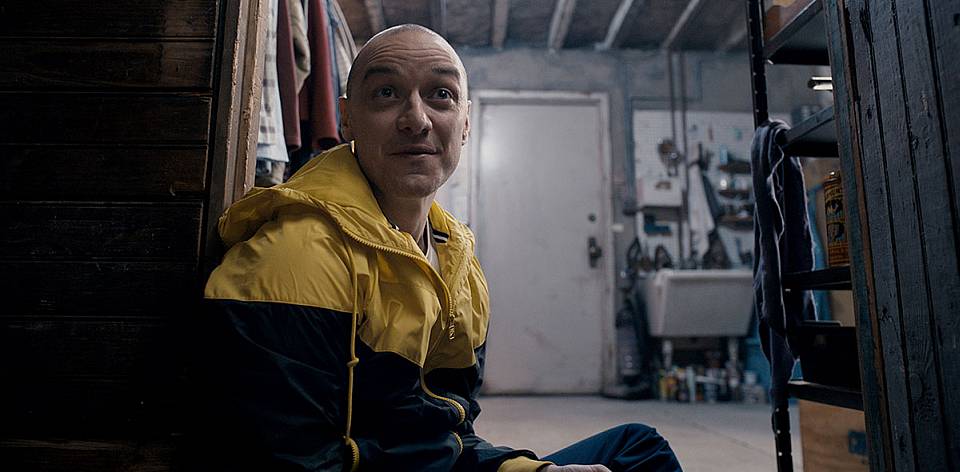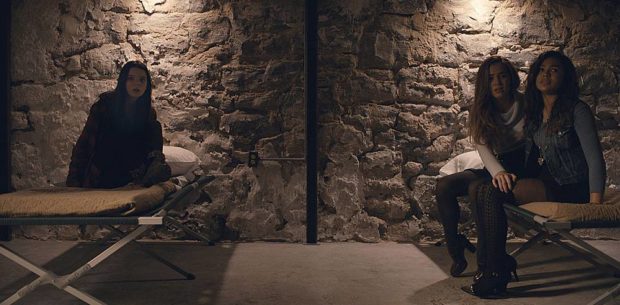It’s incredibly appropriate that M. Night Shyamalan’s latest offering is about split personalities, or more accurately dissociative identity disorder (DID), as there are at least two distinct versions of the writer/director. For many, he is the twist-prone master of suspense hits like The Sixth Sense and Signs. More recently, he has developed a reputation for misguided critical flops like After Earth. Both versions of Shyamalan are equally valid, and to borrow the clinical parlance, distinct and relatively enduring. With SPLIT, Shyamalan reminds us of his command of the former, even if it doesn’t entirely shake the latter.
SPLIT wastes very little time in getting down to business, as friends Claire (Haley Lu Richardson) and Marcia (Jessica Sula), along with the social misfit Casey (Anya Taylor-Joy), are abducted by Kevin (James McAvoy) and kept locked in a windowless room. It soon becomes apparent that Kevin has 23 distinct personalities, and the girls’ abduction is tied into the emergence of the 24th.
Shyamalan is adept at moment-to-moment thrills, maintaining the same kind of high tension that sustained the most nerve-racking moments of The Village. The claustrophobic early moments of confusion in the enclosure, and the sinister hints of a darker purpose, envelop us completely. Shyamalan runs parallel stories around Casey’s past as well as Kevin’s psychiatrist (Betty Buckley), adding layers to the traditional horror setup. West Dylan Thordson’s grinding and droning score certainly maintains this vibe as well, as if it were pulsing directly out of the dimly lit corridors. There’s at least one scene of one the victims trapped inside a locker that is pure adrenaline-pumping horror and a showcase for Shyamalan’s understanding of mise-en-scène.
The constant tension is exacerbated by the unpredictable nature of Kevin’s transformations, with McAvoy turning on a dime at times between a small child, a woman, an artist and so on. While it skirts the edges of pantomime, McAvoy demonstrates it’s possible to be both a character actor and a lead. Genuinely sinister, he’s also sympathetic at times, and in the right circumstances his character could be one of the horror greats. Taylor-Joy, seen most recently as the cold-eyed lead in the capable thriller Morgan, brings a similar mixture of pathos and uncertainty.
Where the film falters in a reliance on horror tropes, including scantily clad femmes deliberately left in their underwear for long stretches. Shyamalan mercifully keeps the gore to a minimum, but the sub-story of Buckley as a concerned psychiatrist has an odd little tone to it. It’s these divergences that cause the narrative to fracture all over the place, and also suffer as many personality crises as its lead.
As SPLIT sputters out to a less than satisfying and anticlimactic conclusion, Shyamalan wraps himself up in a self-created riddle, crafting an answer to something that didn’t necessarily have a question. Indeed, a bonus scene indicates that the creator is more interested in paying tribute to his own cinematic legacy than joining all of the pieces together, and an obligatory twist that you will see coming if you’re paying attention. Nevertheless, SPLIT provides a throwback tension in its initial old-school approach to suspense, even if it dissociates itself from its own strengths in the crucial final act.
[stextbox id=”grey” bgcolor=”F2F2F2″ mleft=”5″ mright=”5″ image=”null”]2016 | US | DIR:M. Night Shyamalan | WRITER: M. Night Shyamalan | CAST: James McAvoy, Anya Taylor-Joy, Betty Buckley, Haley Lu Richardson, Jessica Sula | DISTRIBUTOR: Universal | RUNNING TIME: 117 minutes | RELEASE DATE: 20 January 2017 (US), 26 January 2017 (AUS) [/stextbox]






